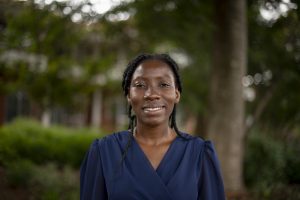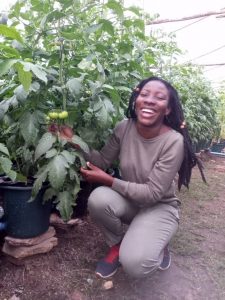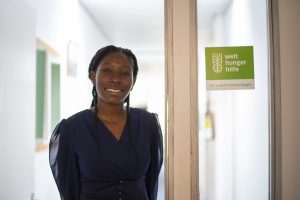Return to Zimbabwe
 Precious Nemutenzi (‘20, Zimbabwe) has always been an exemplary student. While in high school, she participated in the debate club, religious groups, and the student government as class president. In 2013, she won a national writing contest narrating how to improve education in high schools in her region. As a prize, she received a computer with which she continued developing her writing passion capturing a critical and conscious look at different realities. In addition, Precious helped lead the Girls Empowering Movement (GEM) and was vice president of the Leadership Experience Opportunity (LEO).
Precious Nemutenzi (‘20, Zimbabwe) has always been an exemplary student. While in high school, she participated in the debate club, religious groups, and the student government as class president. In 2013, she won a national writing contest narrating how to improve education in high schools in her region. As a prize, she received a computer with which she continued developing her writing passion capturing a critical and conscious look at different realities. In addition, Precious helped lead the Girls Empowering Movement (GEM) and was vice president of the Leadership Experience Opportunity (LEO).
When she decided to study at EARTH, she received a full scholarship from the Mastercard Foundation. After four years of perseverance and hard work, Precious earned her degree in agricultural engineering and prepared to return to Zimbabwe to fulfill her dream of helping her people and her country. However, returning is not always easy. After spending so much time away from home, rebuilding personal and work connections and reframing the broader context of the country is required. Many of our graduates face this challenge, so EARTH University and the Mastercard Foundation partnered to initiate competitive, remunerated post-graduate fellowships for EARTH and other Mastercard Foundation Scholar alumni focused on agriculture and rural development to support students like Precious, return home, transition into the working world and bridge the gap between graduation and employment,
 This program is part of one of the pillars of EARTH Futures: education for leadership. Its goal is to empower and accelerate graduates to lead their countries’ social, environmental, and economic transformation. Precious worked for an entire year under the Fellowship Program to improve farmers’ lives and farming practices in Gokwe, a rural village in southwestern Zimbabwe. She worked with Welt Hunger Hilfe, a German organization that has fought for food security in 70 countries since its inception in 1962.
This program is part of one of the pillars of EARTH Futures: education for leadership. Its goal is to empower and accelerate graduates to lead their countries’ social, environmental, and economic transformation. Precious worked for an entire year under the Fellowship Program to improve farmers’ lives and farming practices in Gokwe, a rural village in southwestern Zimbabwe. She worked with Welt Hunger Hilfe, a German organization that has fought for food security in 70 countries since its inception in 1962.
During that time, she led a project producing edible mushrooms, an uncommon crop in the region that opened up new market possibilities for farmers. According to Precious, mushrooms have great nutritional benefits for people because they are a protein source and can be a sustainable crop. She also led projects with peanuts, an essential ingredient in Zimbabwean cuisine; chilies for different sauces and mango processing. Her goal was to work with various crops and their value chains to innovate them and make them more sustainable.
 “The Fellowship Program benefitted my professional career and my personal development. Thanks to the program, I received virtual tutorials through which I learned a lot. I also had the support of a professional who helped me better cope with my first work experience. I got to know Zimbabwe’s rural communities better and understand the farming environment so I could come up with creative and innovative ways to deliver solutions for these farmers,” Precious says.
“The Fellowship Program benefitted my professional career and my personal development. Thanks to the program, I received virtual tutorials through which I learned a lot. I also had the support of a professional who helped me better cope with my first work experience. I got to know Zimbabwe’s rural communities better and understand the farming environment so I could come up with creative and innovative ways to deliver solutions for these farmers,” Precious says.
Currently, Precious is part of Edinburgh University’s MSc in Global Food Security and Nutrition, a specialization she is studying online while continuing her one-on-one work with Gokwe farmers. She has also worked with World Vision International as a facilitator, teaching other communities how to grow vegetables hydroponically, create community gardens, and produce chickens and eggs. She plans to continue with mango processing in the communities that most need a boost in adding value to their supply chains.
Precious has always been an outstanding woman, ever since she was a child, and now as a young professional who champions the well-being of the Zimbabwean people.




